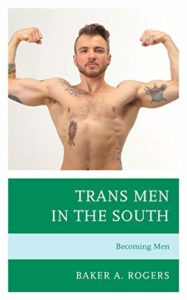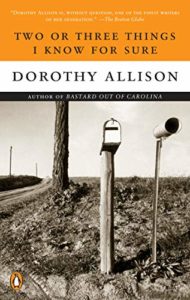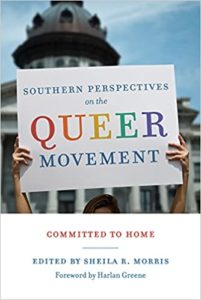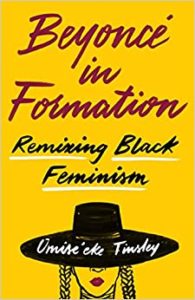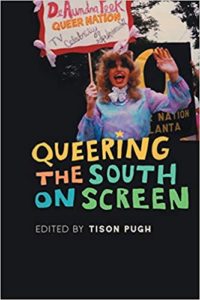By Paige Crowl, Teaching and Learning Librarian, Oxford College Library and Melissa Hackman, Sociology & Development Studies Librarian, Robert W. Woodruff Library
Emory Libraries is excited to continue our celebration of Lesbian, Gay, Bisexual, Transgender and Queer Pride Month. Did you know? June 2020 is the 50th year of Pride celebrations in the United States! In honor of these 50 years of history, we are recommending resources on the experiences of LGBTQ+ folks in the South. Learn about the stories and experiences of LGBTQ+ Southerners, the history of this region as a hub of queer culture, and some perspectives on the intersections of these identities moving forward.
Atlanta is home to a number of LGBTQ+ organizations that work to build community, provide housing and safe spaces, and make the American South a more inclusive and equitable place for LGBTQ+ people across diverse identities. We invite you to get to know their work and support their programs. After these resources, we present you a list of e-books.
Atlanta LGBTQ+ Organizations
Mission: “Southern Fried Queer Pride (SFQP) is an Atlanta-based non-profit organization empowering Black queer and QTPOC centered communities in the South through the arts. Southern Fried Queer Pride (SFQP) was born out of a lack of space for Black and brown queer folks to build community, a lack of queer art, and in opposition of the established narrative of Southern queers. The South is home to the country’s largest population of LGBTQIQAP2+ individuals, yet we’re confined to a narrative of stigma, statistics, and struggle. SFQP fights that notion, and is aiding in uplifting a honest narrative of resilience, rich history, and vibrance.”
Twitter: @sfqpatl
Instagram: @sfqp
Mission: “Lost-n-Found Youth is an Atlanta-based nonprofit that exists to end homelessness for Lesbian, Gay, Bisexual, Transgender, Queer (LGBTQ+) and all sexual minority youth. Through advocacy and outreach activities, our team works tirelessly each day to end homelessness.”
Twitter: @LostNFoundYouth
Instagram: @lost.n.found.youth
SONG: Southerners on New Ground
Mission: “SONG envisions a sustainable South that embodies the best of its freedom traditions and works towards the transformation of our economic, social, spiritual, and political relationships. We envision a multi-issue southern justice movement that unites us across class, age, race, ability, gender, immigration status, and sexuality; a movement in which LGBTQ people – poor and working class, immigrant, people of color, rural – take our rightful place as leaders shaping our region’s legacy and future. We are committed to restoring a way of being that recognizes our collective humanity and dependence on the Earth.”
Twitter: @ignitekindred
Instagram: @ignitekindred
Mission: “To provide safe housing and appropriate supportive services to transgender and gender nonconforming (defined as any personal gender identity different or transgressive from the sex assigned at birth) individuals who are homeless to facilitate movement to independent living and promote productive employment and reduction of risky behaviors, or who seek intermediate or long-term housing that’s centered on the needs of transgender and gender nonconforming people.”
Solutions Not Punishment Collaborative
Mission: “The Solutions Not Punishment Collaborative is a black, trans-led, broad collaborative to restore an Atlanta where every person has the opportunity to grow and thrive without facing unfair barriers, especially from the criminal justice system.”
Instagram: @Snap4freedom
Mission: “LaGender, Inc., is a black and transgender women of color led organization dedicated to empowering the transgender community on the unique issues of HIV/AIDS, homelessness, wrongful incarceration, mental health and the fight against discrimination of any sort.”
Facebook: https://www.facebook.com/lagenderinc/
Personal Memoirs and Stories
“Black. Queer. Southern. Women.” Sharon Bridgforth and E. Patrick Johnson in conversation, Atlanta, Georgia, March 22, 2019. Video conversation by Southern Spaces.
Honeypot: Black Southern Women Who Love Women
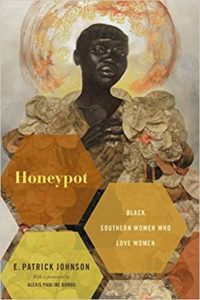
Publisher’s Description: “E. Patrick Johnson’s Honeypot opens with the fictional trickster character Miss B. barging into the home of Dr. EPJ, informing him that he has been chosen to collect and share the stories of her people. With little explanation, she whisks the reluctant Dr. EPJ away to the women-only world of Hymen, where she serves as his tour guide as he bears witness to the real-life stories of queer Black women throughout the American South. The women he meets come from all walks of life and recount their experiences on topics ranging from coming out and falling in love to mother/daughter relationships, religion, and political activism. As Dr. EPJ hears these stories, he must grapple with his privilege as a man and as an academic, and in the process he gains insights into patriarchy, class, sex, gender, and the challenges these women face. Combining oral history with magical realism and poetry, Honeypot is an engaging and moving book that reveals the complexity of identity while offering a creative method for scholarship to represent the lives of other people in a rich and dynamic way.”
Sweet Tea: Black Gay Men of the South
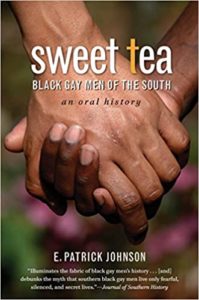 Publisher’s Description: “Giving voice to a population too rarely acknowledged, Sweet Tea collects more than sixty life stories from black gay men who were born, raised, and continue to live in the South. E. Patrick Johnson challenges stereotypes of the South as “backward” or “repressive” and offers a window into the ways black gay men negotiate their identities, build community, maintain friendship networks, and find sexual and life partners–often in spaces and activities that appear to be antigay. Ultimately, Sweet Tea validates the lives of these black gay men and reinforces the role of storytelling in both African American and southern cultures.”
Publisher’s Description: “Giving voice to a population too rarely acknowledged, Sweet Tea collects more than sixty life stories from black gay men who were born, raised, and continue to live in the South. E. Patrick Johnson challenges stereotypes of the South as “backward” or “repressive” and offers a window into the ways black gay men negotiate their identities, build community, maintain friendship networks, and find sexual and life partners–often in spaces and activities that appear to be antigay. Ultimately, Sweet Tea validates the lives of these black gay men and reinforces the role of storytelling in both African American and southern cultures.”
Black. Queer. Southern. Women.: An Oral History
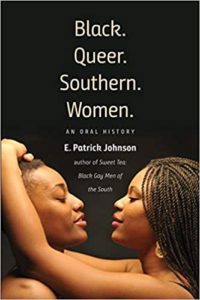
Publisher’s Description: “Drawn from the life narratives of more than seventy African American queer women who were born, raised, and continue to reside in the American South, this book powerfully reveals the way these women experience and express racial, sexual, gender, and class identities–all linked by a place where such identities have generally placed them on the margins of society. Using methods of oral history and performance ethnography, E. Patrick Johnson’s work vividly enriches the historical record of racialized sexual minorities in the South and brings to light the realities of the region’s thriving black lesbian communities. At once transcendent and grounded in place and time, these narratives raise important questions about queer identity formation, community building, and power relations as they are negotiated within the context of southern history. Johnson uses individual stories to reveal the embedded political and cultural ideologies of the self but also of the listener and society as a whole. These breathtakingly rich life histories show afresh how black female sexuality is and always has been an integral part of the patchwork quilt that is southern culture.”
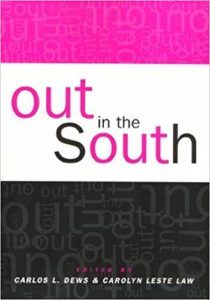 Publisher’s Description: “In this book gays and lesbians from the Deep South to East Texas and Appalachia speak from vivid personal experience and turn an analytical eye on the South and its culture. Some contributors examine the power of traditional Southern attitudes toward race and religion, and consider the “don’t ask, don’t tell” attitude about homosexuality in some communities (the “public secret”). Other contributors show how gay culture is thriving in the form of women’s festivals, gay bars, and unusual networks like that of Asian and Pacific Islanders in Atlanta. Out in the South is organized into sections that focus on a central metaphor of space and location. This grounds the book in the sense of the South as a special region and in the inside/outside dilemma faced by many gay and lesbian Southerners as they negotiate their place in an often-inhospitable homeland.”
Publisher’s Description: “In this book gays and lesbians from the Deep South to East Texas and Appalachia speak from vivid personal experience and turn an analytical eye on the South and its culture. Some contributors examine the power of traditional Southern attitudes toward race and religion, and consider the “don’t ask, don’t tell” attitude about homosexuality in some communities (the “public secret”). Other contributors show how gay culture is thriving in the form of women’s festivals, gay bars, and unusual networks like that of Asian and Pacific Islanders in Atlanta. Out in the South is organized into sections that focus on a central metaphor of space and location. This grounds the book in the sense of the South as a special region and in the inside/outside dilemma faced by many gay and lesbian Southerners as they negotiate their place in an often-inhospitable homeland.”
Queer South Rising: Voices of a Contested Place
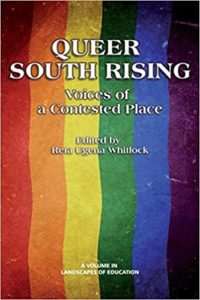 Publisher’s Description: “Queer South Rising: Voices of a Contested Place is a collection of essays about the South by people who identify as both Southern and queer. The collection’s name hints at the provocative nature of its contents: placing Queer and South side by side challenges readers to think about each word differently. The idea that a queer South might rise undermines the Battle Cry of “The South’s Gonna rise Again!” embedded in the collective memory of a conservative South. This rising does not refer to a kind of Enlightenment transcendence where the region achieves some sort of distinctive prominence. It suggests instead ruptures, like furrows in a plowed field where seeds are sown. The rising Whitlock envisions is akin to breaking and turning over meanings of Southern place. The title further serves to remind readers of the complexities of the place as it calls into question notions of a universal, homogenous LGBT, queer, identity. Queer South Rising is the first truly interdisciplinary collection of essays on the South and queerness that deliberately aims for multiple approaches to the topics.”
Publisher’s Description: “Queer South Rising: Voices of a Contested Place is a collection of essays about the South by people who identify as both Southern and queer. The collection’s name hints at the provocative nature of its contents: placing Queer and South side by side challenges readers to think about each word differently. The idea that a queer South might rise undermines the Battle Cry of “The South’s Gonna rise Again!” embedded in the collective memory of a conservative South. This rising does not refer to a kind of Enlightenment transcendence where the region achieves some sort of distinctive prominence. It suggests instead ruptures, like furrows in a plowed field where seeds are sown. The rising Whitlock envisions is akin to breaking and turning over meanings of Southern place. The title further serves to remind readers of the complexities of the place as it calls into question notions of a universal, homogenous LGBT, queer, identity. Queer South Rising is the first truly interdisciplinary collection of essays on the South and queerness that deliberately aims for multiple approaches to the topics.”
Trans Men in the South: Becoming Men
Publisher’s Description: “Through the voices of 51 trans men, Baker A. Rogers analyzes what it means to be a trans man in the southeastern United States. Rogers argues that the common themes that pervade trans men’s experiences in the South are complicated by other intersecting identities, such as sexuality, religion, race, class, and place. This study explores the intersectionalities of a group of people who are often invisible, by choice or necessity, in broader culture. Rogers engages with debates about trans experiences of masculinity, ‘passing,’ and discrimination within LGTBQ spaces in order to provide a comprehensive study of trans men’s experiences.”
Two or Three Things I Know for Sure
Publisher’s Description: “Illustrated with photographs from the author’s personal collection, Two or Three Things I Know for Sure tells the story of the Gibson women — sisters, cousins, daughters, and aunts — and the men who loved them, often abused them, and, nonetheless, shared their destinies. With luminous clarity, Allison explores how desire surprises and what power feels like to a young girl as she confronts abuse.”
Every True Pleasure: LGBTQ Tales of North Carolina
Publisher’s Description: “Some of North Carolina’s finest fiction and nonfiction writers come together in Every True Pleasure, including David Sedaris, Kelly Link, Allan Gurganus, Randall Kenan, and more. Within the volume—featuring writers who identify as gay, trans, bisexual, and straight—are stories and essays that view the full spectrum of contemporary life though an LGBTQ lens. These writers, all native or connected to North Carolina, show the multifaceted challenges and joys of LGBTQ life, including young love and gay panic, the minefield of religion, military service, having children with a surrogate, family rejection, finding one’s true gender, finding sex, and finding love.”
Southern Perspectives on the Queer Movement: Committed to Home
Publisher’s Description: “In Southern Perspectives on the Queer Movement: Committed to Home, Sheila R. Morris has collected essays by South Carolinians who explore their gay identities and activism from the emergence of the HIV-AIDS pandemic to the realization of marriage equality in the state thirty years later. Each of the volume’s nineteen essays addresses an aspect of gay life, from hesitant coming-out acts in earlier decades to the creation of grassroots organizations. All the contributors have taken public roles in the gay rights movement.”
Historical
Welcome to Fairyland: Queer Miami Before 1940
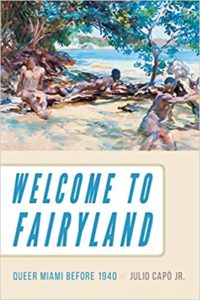
Publisher’s Description: “Poised on the edge of the United States and at the center of a wider Caribbean world, today’s Miami is marketed as an international tourist hub that embraces gender and sexual difference. As Julio Capó Jr. shows in this fascinating history, Miami’s transnational connections reveal that the city has been a queer borderland for over a century. In chronicling Miami’s queer past from its 1896 founding through 1940, Capó shows the multifaceted ways gender and sexual renegades made the city their own.”
Queering the Redneck Riviera: Sexuality and the Rise of Florida Tourism
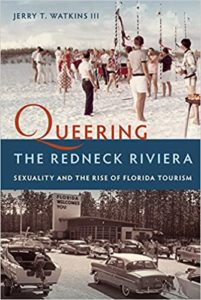 Publisher’s Description: “Queering the Redneck Riviera recovers the forgotten and erased history of gay men and lesbians in North Florida, a region often overlooked in the story of the LGBTQ experience in the United States. Jerry Watkins reveals both the challenges these men and women faced in the years following World War II and the essential role they played in making the Emerald Coast a major tourist destination.In a state dedicated to selling an image of itself as a “family-friendly” tropical paradise and in an era of increasing moral panic and repression, queer people were forced to negotiate their identities and their places in society. Watkins re-creates queer life during this period, drawing from sources including newspaper articles, advertising and public relations campaigns, oral history accounts, government documents, and interrogation transcripts from the state’s Johns Committee.”
Publisher’s Description: “Queering the Redneck Riviera recovers the forgotten and erased history of gay men and lesbians in North Florida, a region often overlooked in the story of the LGBTQ experience in the United States. Jerry Watkins reveals both the challenges these men and women faced in the years following World War II and the essential role they played in making the Emerald Coast a major tourist destination.In a state dedicated to selling an image of itself as a “family-friendly” tropical paradise and in an era of increasing moral panic and repression, queer people were forced to negotiate their identities and their places in society. Watkins re-creates queer life during this period, drawing from sources including newspaper articles, advertising and public relations campaigns, oral history accounts, government documents, and interrogation transcripts from the state’s Johns Committee.”
The lesbian South: Southern feminists, The Women in Print Movement, and The Queer Literary Canon
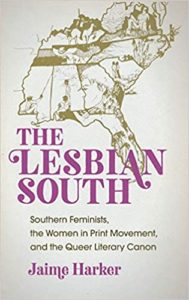 Publisher’s Description: “In this book, Jaime Harker uncovers a largely forgotten literary renaissance in southern letters. Anchored by a constellation of southern women, the Women in Print movement grew from the queer union of women’s liberation, civil rights activism, gay liberation, and print culture. Broadly influential from the 1970s through the 1990s, the Women in Print movement created a network of writers, publishers, bookstores, and readers that fostered a remarkable array of literature. With the freedom that the Women in Print movement inspired, southern lesbian feminists remade southernness as a site of intersectional radicalism, transgressive sexuality, and liberatory space. Including in her study well-known authors—like Dorothy Allison and Alice Walker—as well as overlooked writers, publishers, and editors, Harker reconfigures the southern literary canon and the feminist canon, challenging histories of feminism and queer studies to include the south in a formative role.”
Publisher’s Description: “In this book, Jaime Harker uncovers a largely forgotten literary renaissance in southern letters. Anchored by a constellation of southern women, the Women in Print movement grew from the queer union of women’s liberation, civil rights activism, gay liberation, and print culture. Broadly influential from the 1970s through the 1990s, the Women in Print movement created a network of writers, publishers, bookstores, and readers that fostered a remarkable array of literature. With the freedom that the Women in Print movement inspired, southern lesbian feminists remade southernness as a site of intersectional radicalism, transgressive sexuality, and liberatory space. Including in her study well-known authors—like Dorothy Allison and Alice Walker—as well as overlooked writers, publishers, and editors, Harker reconfigures the southern literary canon and the feminist canon, challenging histories of feminism and queer studies to include the south in a formative role.”
Rebels, Rubyfruit, and Rhinestones: Queering Space in the Stonewall South
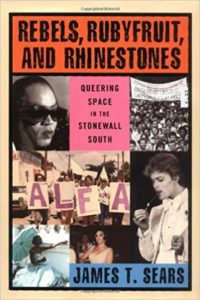 Publisher’s Description: “While Scarlett O’Hara may resemble a drag queen, and Mardi Gras inspires more camp than a gay pride parade, the American South also boasts a rich, authentic and transgressive gay and lesbian history. In this chatty, free-ranging cultural survey, Sears (Growing Up Gay in the South) presents a vivid kaleidoscope of the mores and political activities of many gay Southerners following the 1969 Stonewall riots and leading up to the 1979 march on Washington. Sears unspools this history through portraits of activists and community organizers including Merril Mushroom, Jack Nichols, Lige Clark, Vicki Gabriner, Minnie Bruce Pratt and Sgt. Leonard Matlovitch who helped shape the social and political climate below the Mason Dixon line and often in the rest of the country.”
Publisher’s Description: “While Scarlett O’Hara may resemble a drag queen, and Mardi Gras inspires more camp than a gay pride parade, the American South also boasts a rich, authentic and transgressive gay and lesbian history. In this chatty, free-ranging cultural survey, Sears (Growing Up Gay in the South) presents a vivid kaleidoscope of the mores and political activities of many gay Southerners following the 1969 Stonewall riots and leading up to the 1979 march on Washington. Sears unspools this history through portraits of activists and community organizers including Merril Mushroom, Jack Nichols, Lige Clark, Vicki Gabriner, Minnie Bruce Pratt and Sgt. Leonard Matlovitch who helped shape the social and political climate below the Mason Dixon line and often in the rest of the country.”
Queer Intersections / Southern Spaces
“Queer Intersections / Southern Spaces is a collection of interdisciplinary, multimedia publications that explore, trouble, and traverse intersections of queer experiences, past, present, and future. From a variety of perspectives, and with an emphasis upon the US South, this series, edited by Eric Solomon, offers critical analysis of LGBTQ+ people, practices, spaces, and places.”
Where Do We Go From Here?
A Dirty South Manifesto: Sexual Resistance and Imagination in the New South
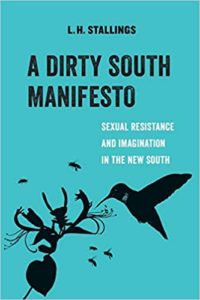 Publisher’s Description: “From the shutdown of Planned Parenthood clinics and rising rates of HIV to opposition to marriage equality and bathroom bills, the New South is the epicenter of the new sex wars. Antagonism toward reproductive freedom, partner rights, and transgender rights has revealed a new and unacknowledged era of southern reconstruction centered on gender and sexuality. In A Dirty South Manifesto, L. H. Stallings celebrates the roots of radical sexual resistance in the New South—a movement that is antiracist, decolonial, and transnational. For people within economically disenfranchised segments of society, those in sexually marginalized communities, and the racially oppressed, the South has been a sexual dystopia. Throughout this book, Stallings delivers hard-hitting manifestos for the new sex wars. With her focus on contemporary Black southern life, Stallings offers an invitation to anyone who has ever imagined a way of living beyond white supremacist heteropatriarchy.”
Publisher’s Description: “From the shutdown of Planned Parenthood clinics and rising rates of HIV to opposition to marriage equality and bathroom bills, the New South is the epicenter of the new sex wars. Antagonism toward reproductive freedom, partner rights, and transgender rights has revealed a new and unacknowledged era of southern reconstruction centered on gender and sexuality. In A Dirty South Manifesto, L. H. Stallings celebrates the roots of radical sexual resistance in the New South—a movement that is antiracist, decolonial, and transnational. For people within economically disenfranchised segments of society, those in sexually marginalized communities, and the racially oppressed, the South has been a sexual dystopia. Throughout this book, Stallings delivers hard-hitting manifestos for the new sex wars. With her focus on contemporary Black southern life, Stallings offers an invitation to anyone who has ever imagined a way of living beyond white supremacist heteropatriarchy.”
Beyoncé in Formation: Remixing Black Feminism
Publisher’s Description: “Making headlines when it was launched in 2015, Omise’eke Tinsley’s undergraduate course “Beyoncé Feminism, Rihanna Womanism” has inspired students from all walks of life. In Beyoncé in Formation, Tinsley now takes her rich observations beyond the classroom, using the blockbuster album and video Lemonade as a soundtrack for vital new-millennium narratives.Woven with candid observations about her life as a feminist scholar of African studies and a cisgender femme married to a trans spouse, Tinsley’s “Femme-onade” mixtape explores myriad facets of black women’s sexuality and gender. Turning to Beyoncé’s “Don’t Hurt Yourself,” Tinsley assesses black feminist critiques of marriage and then considers the models of motherhood offered in “Daddy Lessons,” interspersing these passages with memories from Tinsley’s multiracial family history. Her chapters on nontraditional bonds culminate in a discussion of contemporary LGBT politics through the lens of the internet-breaking video “Formation,” underscoring why Beyoncé’s black femme-inism isn’t only for ciswomen. From pleasure politics and the struggle for black women’s reproductive justice to the subtext of blues and country music traditions, the landscape in this tour is populated by activists and artists (including Loretta Lynn) and infused with vibrant interpretations of Queen Bey’s provocative, peerless imagery and lyrics.”
Queering Education in the Deep South
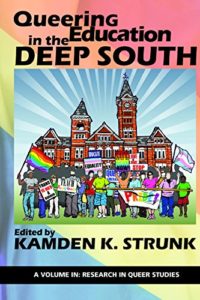 Publisher’s Description: “This volume explores education in the Deep South, with a focus on LGBTQ students and educators, and on queer theoretical perspectives in education. The topics in this volume include teaching LGBTQ issues and queer studies in the Deep South, educational policy and practice in the Deep South as related to queer issues, and efforts to introduce queer literature to libraries and queer collections to archives. Authors in this volume examine what realities exist in education in the U.S. South currently, and what possibilities might be imagined in the future.”
Publisher’s Description: “This volume explores education in the Deep South, with a focus on LGBTQ students and educators, and on queer theoretical perspectives in education. The topics in this volume include teaching LGBTQ issues and queer studies in the Deep South, educational policy and practice in the Deep South as related to queer issues, and efforts to introduce queer literature to libraries and queer collections to archives. Authors in this volume examine what realities exist in education in the U.S. South currently, and what possibilities might be imagined in the future.”
Publisher’s Description: “In this book gays and lesbians from the Deep South to East Texas and Appalachia speak from vivid personal experience and turn an analytical eye on the South and its culture. Some contributors examine the power of traditional Southern attitudes toward race and religion, and consider the “don’t ask, don’t tell” attitude about homosexuality in some communities (the “public secret”). Other contributors show how gay culture is thriving in the form of women’s festivals, gay bars, and unusual networks like that of Asian and Pacific Islanders in Atlanta. Out in the South is organized into sections that focus on a central metaphor of space and location. This grounds the book in the sense of the South as a special region and in the inside/outside dilemma faced by many gay and lesbian Southerners as they negotiate their place in an often-inhospitable homeland.”
Queering Spirituality and Community in the Deep South
Publisher’s Description: “In this volume, authors explore the interconnected issues of spirituality and community as they relate to queer issues in the Deep South. The book begins with explorations of queer spiritualities and LGBTQ people in religious settings. Next, authors investigate and document the rise of the religious right political movement in the South. Finally, the authors of this text document community life for LGBTQ people in the Deep South, including efforts to create affirming queer spaces inside otherwise hostile locales.Through the chapters in this text, the peculiarities of spirituality and community life for LGBTQ people in the Deep South are explored. However, this volume also points to trends, themes, and dynamics at work in the Deep South that are also implicated in the queer experience in other parts of the U.S. The authors of this text push readers to think deeply about these issues, probe the limits of queer potentialities in Southern religious and community contexts, and clearly point to the interweaving of Christian religiousness, communities of practice, the operation of white supremacist heteropatriarchy in oppression of LGBTQ people, and the possibilities of affirming spiritual and community praxis.”


